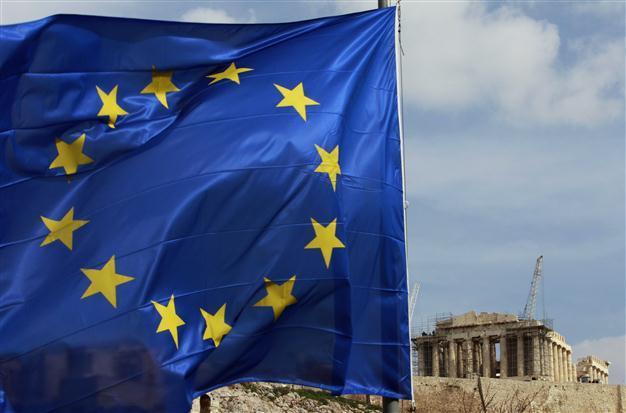Greek debt deal draws mixed welcome across Europe
PARIS - Agence France-Presse

REUTERS Photo
The debt rescue for Greece agreed by eurozone finance ministers on Tuesday is a success all round, EU leaders declared, but Greek media were wary and analysts relieved but sceptical.
Here are some keynote comments by officials and sober analysis from financial markets.
The head of the Eurogroup of finance ministers, Luxembourg's Jean-Claude Juncker, unveiled the accord before daybreak saying it would "secure Greece's future in the eurozone".
EU Economic Affairs Commissioner Ollie Rehn stressed that the European Union's biggest bailout ever would "substantially reduce the debt burden of Greece and will help to reform the economy and administration so as to return to growth and creating jobs".
Greek Prime Minister Lucas Papademos hailed a "historic day" for Athens but warned that much work lay ahead.
French European Affairs Minister Jean Leonetti said: "This is an accord of solidarity and discipline. It's a moral duty, we do not abandon the most fragile, it's a political duty." He told the French parliament: "We defend Europe and the euro ... we prevent contagion ... Saving a country from bankruptcy, that's also saving the population from misery." French Foreign Minister Alain Juppe said that an exit of Greece from the eurozone would sink it into "dreadful chaos".
"Because immediately the new drachma would lose more than half of its value, Greek debt would be doubled and Greece would be bankrupt because no one else would lend it money," he warned.
In Norway, which is not in the European Union and also not in the eurozone, the head of the central bank Oeystein Olsen, said: "There has been some positive news but ... they're shuffling the debt around ... We should perhaps be relatively optimistic but I am not quite sure that we have seen the last round of unrest in Europe." The head of private creditors grouped in the Institute of International Finance (IIF) owed money by Greece, Charles Dallara, said in Brussels: "I would not want to say that this is a definitive turning point. I do feel that it is part of a turning process." Newspapers in Greece gave the deal a wary welcome, underscoring the austerity to come and lamenting the unprecedented EU fiscal surveillance now imposed on the country.
Centre-left dailies Ethnos spoke of a "heavy price to pay" and Ta Nea of "conditional salvation", while financial daily Naftemboriki echoed market doubts about the long-term viability of the debt.
"Even if everything works out, the cost to secure the new opportunity afforded to us is a heavy one," Ethnos noted.
On financial markets, Scott Atkinson of Briefing Research said: "Now the hard work begins -- reinventing Greece's economy." Gekko Global Markets analyst Anita Paluch said: "The debt-stricken country needs a plan for growth and this seems to be the biggest challenge at the moment." Kathleen Brooks, research director at trading site Forex.com, cast doubt on the ability of Greece to meet its targets.
"Greece has got its bailout so there will be no default on March 20 -- but no one believes Greece will reach a sustainable debt load by 2020, so there could be more bailout discussions down the road," Brooks told AFP.
"The immediate future may be secure for Greece -- but its long-term position in the eurozone is as precarious as ever." ING analyst Carsten Brzeski warned that the Greek deal could run into serious problems, citing the need for parliamentary approval in Germany, and probably Finland and The Netherlands as well.
Greece would probably face major problems in pushing through more harsh austerity measures, he warned. "Greece should be saved, at least for the next couple of months. However, the feeling of relief is not likely to last for long." Jane Foley at Rabobank forecast that "the country's troubles will continue to play out for years", while Barclays Capital analyst Nick Verdi saw an early risk from elections in Greece in April.
"Parties further from the centre continue to gain popular support and none of those parties has expressed support for the next programme," he noted.
Ernst & Young senior analyst Marie Diron said: "We may be seeing the blueprint of new relationships between governments in the eurozone, whereby much closer peer scrutiny is enforced to ensure that unsustainable public finances are prevented or at least corrected." One of the hardest lines was taken by an academic, Michael Ben-Gad who heads the economics department at City University in London.
"My scepticism is long-standing, my argument remains that the Greek state is insolvent, and even after the new agreement that remains the case," he said.
